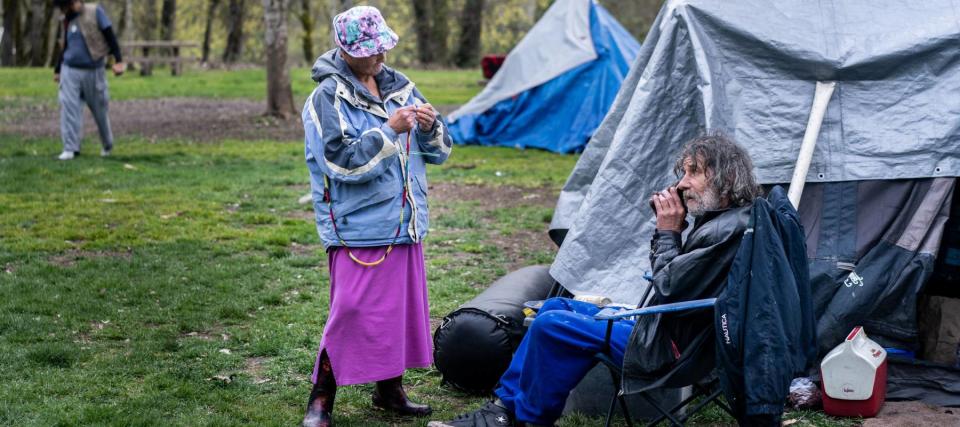American boomers own a staggering 50% of US wealth — but research shows they’re becoming homeless at an alarming rate

Baby boomers might have the highest net worth by generation, but experts say that wealth looks very different once you dive more deeply into the demographics.
Sure, the group holds about half of all U.S. wealth — with much of it tied up in real estate — but it’s mainly attributed to older boomers born between 1946 and 1954. Younger boomers, on the other hand, are increasingly sliding into homelessness — a problem, experts say, is rooted in major events that took place as they entered adulthood.
Don't miss
Commercial real estate has beaten the stock market for 25 years — but only the super rich could buy in. Here's how even ordinary investors can become the landlord of Walmart, Whole Foods or Kroger
Cost-of-living in America is still out of control — use these 3 'real assets' to protect your wealth today, no matter what the US Fed does or says
These 5 magic money moves will boost you up America's net worth ladder in 2024 — and you can complete each step within minutes. Here's how
“We need to fix the federal safety net,” University of Pennsylvania social policy professor Dennis Culhane says in an interview with the Wall Street Journal.
“We should not have destitute elderly or disabled people in the richest country on Earth.”
Younger boomers in peril
Federal data shows more than one in five Americans facing homelessness last year were aged 55 or older. Experts say this group makes up the fastest-growing segment of the unhoused population.
Culhane’s research indicates younger boomers have actually made up about a third of the homeless population for decades, especially after a resurgence in homelessness in the 1980s.
Why? Part of the problem is that the second half of the boomer generation grappled with major hurdles as they came of age.
“They faced a very crowded housing market, prices were escalating,” says Culhane. “Young adults, in particular, faced the challenge of getting entry into the labor market.”
To make matters worse, the crack epidemic in the 1980s impacted many of this cohort, leading them to struggle with homelessness and remain at risk as they aged as well.
The other issue is that many folks worked in jobs that didn’t contribute to Social Security, such as in casual construction and demolition work, making them ineligible for these benefits in retirement.
“Sometimes, if you miss a window by even five years, 10 years, you’re looking at a very different housing market or you’re looking at a very different labor market — and it takes time to catch up,” says Redfin senior economist Chen Zhao.
Read more: Jeff Bezos and Oprah Winfrey invest in this asset to keep their wealth safe — you may want to do the same in 2024
Few housing options available
Older boomers hold a significant slice of the real estate market pie, since they were able to purchase homes for cheaper prices when they were younger. Consequently, that group is more likely than others to have paid off their mortgages already.
The high prices and interest rates of today mean many are choosing to age in place — exacerbating the housing shortage.
“They feel a connection to the community,” says Zhao, adding that some feel financially “stuck” with their homes.
“It’s especially acute of a problem right now because millennials are kind of at a prime homebuying time in their lives — and the millennial generation is a very large generation.”
This means increasingly slim pickings for younger boomers, especially with a shortage of more affordable starter homes, as builders are more prone to building larger, more expensive properties.
While some experts have predicted change could be imminent, with older baby boomers potentially downsizing to smaller homes, others aren’t so sure.
“If you are looking for inventory from that mechanism, it’s going to be a trickle,” cautions Zhao. It’s not going to be this big tsunami that happens all of a sudden.”
In the meanwhile, low-cost assisted-living centers are closing down amid staffing shortages and a lack of funding, leaving elderly Americans with few options for long-term care.
Culhane notes that the Biden administration’s 2024 budget includes a $3 billion grant program to support older adults in unstable housing situations and those who are currently experiencing homelessness.
While he’s skeptical the budget is likely to pass, Culhane says this marks the first time a federal proposal has addressed the elderly homelessness crisis — which could open doors to more conversations around the issue.
What to read next
Car insurance premiums in America are through the roof — and only getting worse. But 5 minutes could have you paying as little as $29/month
‘Baby boomers bust': Robert Kiyosaki warns that older Americans will get crushed in the 'biggest bubble in history' — 3 shockproof assets for instant insurance now
The 5 most expensive mistakes in options trading and how to avoid them
This article provides information only and should not be construed as advice. It is provided without warranty of any kind.

 Yahoo Finance
Yahoo Finance 